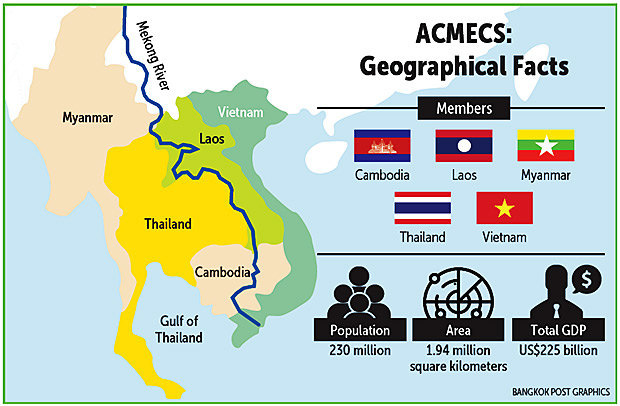
Foreign Minister Don Pramudwinai has stressed the importance of the Ayeyawady-Chao Phraya-Mekong Economic Cooperation Strategy (Acmecs) which will greatly benefit the livelihoods of the more than 230 million people living in the five member countries.
Mr Don said the Acmecs initiative was initiated by Thailand. Acmecs was founded in 2003 with a vision to reduce the economic gap and promote sustainable development in the five countries of the Mekong sub-region, namely Cambodia, Laos, Myanmar, Thailand and Vietnam.
After 15 years, Thailand this year has the honour of hosting the 8th Acmecs Summit under the theme "Towards an Integrated and Connected Mekong Community" from the 15-16 June 2018.
Acmecs has made notable progress since its inception, Mr Don was quoted as saying.
The region has been blessed with abundant national resources and a vast market of over 230 million people making it one of the fastest growing sub-regions in the world with an impressive average annual growth rate of 7%.

In addition, new opportunities have arisen in Acmecs, thanks to its strategic location enabling it to serve as a land-bridge linking economies between the Indian and Pacific oceans.
However, Acmecs has no intention of resting on its laurels.
Acmecs is facing new emerging challenges such as an ageing society, rapid urbanisation, trade protectionism, anti-globalisation trends, and climate change. Each country has acknowledged the need to recalibrate, reform and rebrand itself to address these challenges.
Taking into account these emerging challenges and opportunities, Mr Don added that Thailand has put forward a draft of an Acmecs Master Plan 2019-2023 under the vision of "Building Acmecs CONNECT by 2023". The draft is expected to be adopted by Acmecs leaders at this summit.
The master plan, the first for the sub-region, will serve as a guideline for Acmecs countries on how to tackle new challenges so that they can capitalise on the sub-region's economic potential.
The master plan's main objective is to create a sub-region with transport, digital and energy connectivity in order to facilitate movement of people, goods and services, and boost trade and investment. The plan is to create a sub-region with synchronised rules and regulations in order to enhance investment and a population which possesses adequate knowledge of modern technology and environmental sustainability.
Cooperation with the private sector and external partners is integral to the effective execution of the master plan.
Acmec countries are firmly committed to continuing their close cooperation and forging partnerships with all stakeholders, including the business sector, financial institutions and development partners.
Input from these stakeholders was shared at the Acmecs CEO forum held for the first time yesterday. It brought together leading CEOs from across Asia to discuss the private sector's role in enhancing Acmecs cooperation.
"It is my conviction that our people will benefit from a seamless, synchronised, and smart and sustainable Acmecs," Mr Don said.
"It will help enhance the movement of goods and services, promote intra-regional trade, and attract foreign investments to our region. In turn, this will open up employment opportunities, lessen income disparities amongst member countries and foster sustainable growth and development," Mr Don stressed.
Through human resource development, "Smart Farmers" and Small and Medium Enterprises (SMEs) will be able to apply new skills and modern technology in their trade to increase efficiency and competitiveness.
"Moreover, our people will live in 'Smart Cities' which will enrich their livelihood, increase access to transport, and provide the required digital and energy infrastructure so that they can pursue their dreams and aspirations. Our people will enjoy transportation that is faster and safer than ever before through the East-West Economic Corridor (Ewec) and Southern Economic Corridor (SEC), Mr Don said.
At the regional and global level, the master plan will turn the sub-region into a regional and global powerhouse and thus ensure prosperity and sustainability in the Mekong sub-region.
It will also create a community within a community, bring Asean people closer together, and increase the likelihood of achieving the United Nations 2030 Sustainable Development Goals (SDGs).
This will ensure that Acmecs becomes a "brand" that is reflective of growth driving the regional and global economy and as a responsible and constructive player in the international community.
Thailand, as the chair of Acmecs during 2017-2018 and the host of the 8th Acmecs Summit, is committed to growing stronger with its neighbouring countries under the Thailand Plus One strategy, Mr Don said.
The foreign minister added that the imminent Acmecs Master Plan will ensure a coherent pathway towards an integrated and connected Mekong community that leaves no one behind.
The 8th Acmecs Summit is thus another monumental milestone, he said.